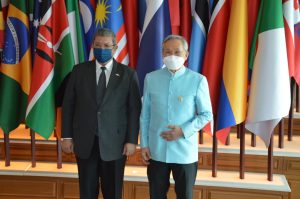Malaysia wants the Association of Southeast Asian Nations (ASEAN) to begin engaging directly with the opponents of Myanmar’s military junta and has aired the possibility of involving outside countries in the bloc’s peace plan, Foreign Minister Saifuddin Abdullah said yesterday.
During a state visit to Thailand, Saifuddin told reporters that it was of the “utmost importance” that the Southeast Asian bloc engages with the opposition groups formed after the February 2021 coup. The most prominent of these is the National Unity Government (NUG), which is spearheading the national political and armed resistance to the military.
“Now it is one-sided, we are only engaging the junta,” he told reporters, Reuters reported. ASEAN’s Five-Point Consensus peace plan, which calls for inclusive dialogue involving “all parties” to Myanmar’s conflict, but the military junta has unilaterally excluded the NUG and other opponents from talks by branding them “terrorists.” It has also criticized Saifuddin’s past calls for talks with the opposition as a breach of ASEAN’s principle of “non-interference.”
While this is not the first time that Saifuddin has called for ASEAN to engage with the NUG, the idea appears to be gaining traction as the bloc’s members run out of patience with the Myanmar junta over its failure to implement the Five-Point Consensus. Despite agreeing to the Consensus at a special summit last April, the military administration has done nearly nothing to implement it, keeping up its violent attempts to crush the resistance and refusing ASEAN’s special envoy access to detained members of the ousted civilian government, including leader Aung San Suu Kyi.
This reality was driven home by the junta’s execution of four political prisoners last month, on the eve of last week’s ASEAN Foreign Ministers’ Meeting in Phnom Penh, which appears to have dispelled the boundlessly optimistic expectations from some ASEAN members that the military could be coaxed into productive engagement.
The international condemnations of the executions ensured that Myanmar figured high on the agenda of the meeting. The joint communique that followed the meeting was relatively mild in its comments on Myanmar – unsurprisingly, since the military junta was involved in its drafting – but the remaining nine ASEAN members say they will reassess Naypyidaw’s adherence to the Five-Point Consensus at the ASEAN Summit in November.
During his press conference in Bangkok yesterday, Saifuddin said that the bloc’s foreign ministers (minus Myanmar, which was excluded from participating) had also discussed the possibility of seeking support from outside states to help with the ASEAN-led peace process. While he didn’t name any particular countries, he said that “some of us brought it to the table that if ASEAN cannot do it alone then we will probably have to engage some of our ASEAN dialogue partners.” ASEAN currently has dialogue partnerships with 11 nations and groupings: Australia, Canada, China, the European Union, India, Japan, New Zealand, Russia, South Korea, the United Kingdom, and the United States.
So far, most of these nations have been happy to back ASEAN to resolve the crisis, given the complexity of the country’s internal conflicts and their reluctance to get involved directly, beyond the imposition of relatively cost-free sanctions. Whether or not outside countries become closely involved in the diplomatic process, the next three months could be crucial in shaping ASEAN’s approach toward the crisis in Myanmar.

































